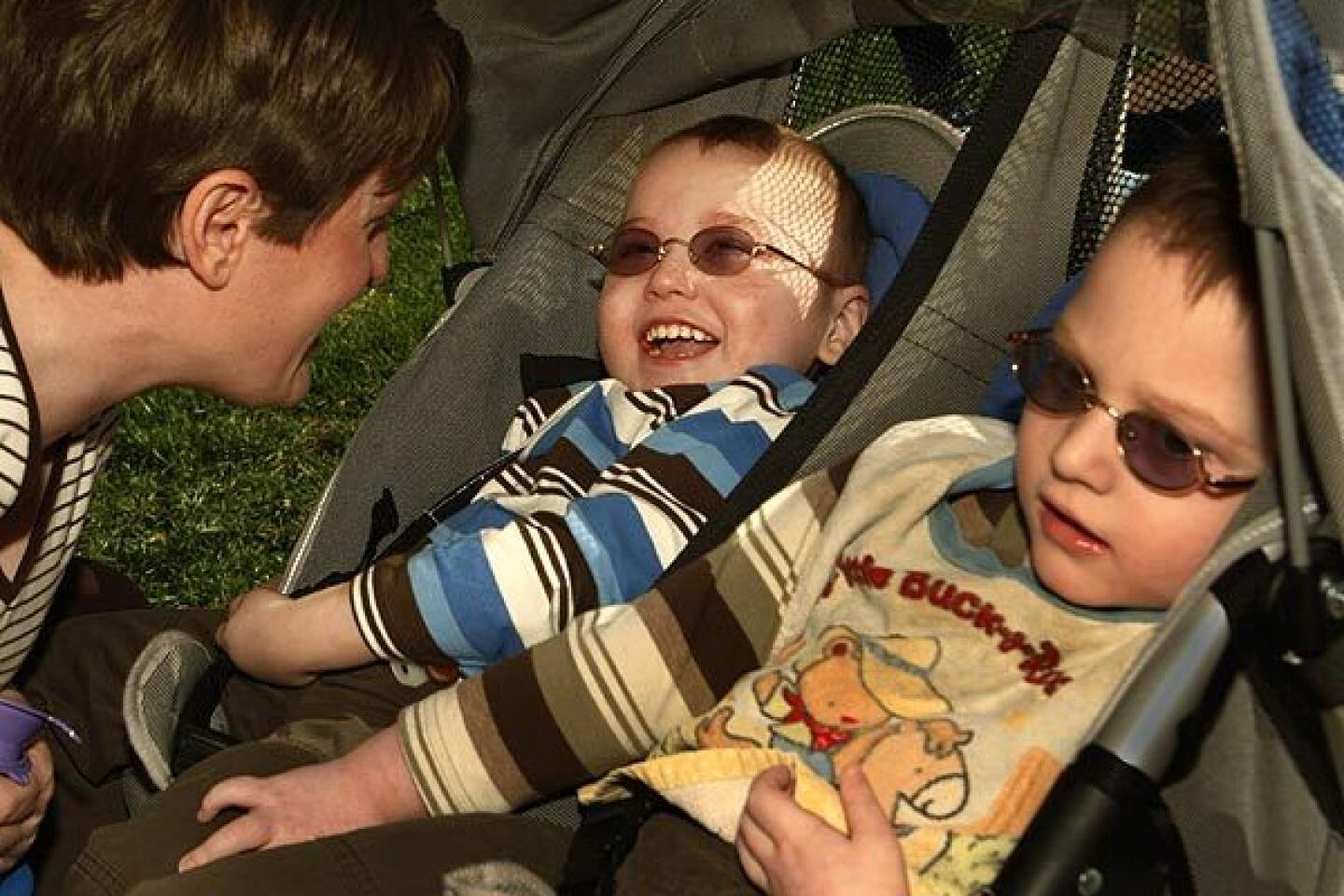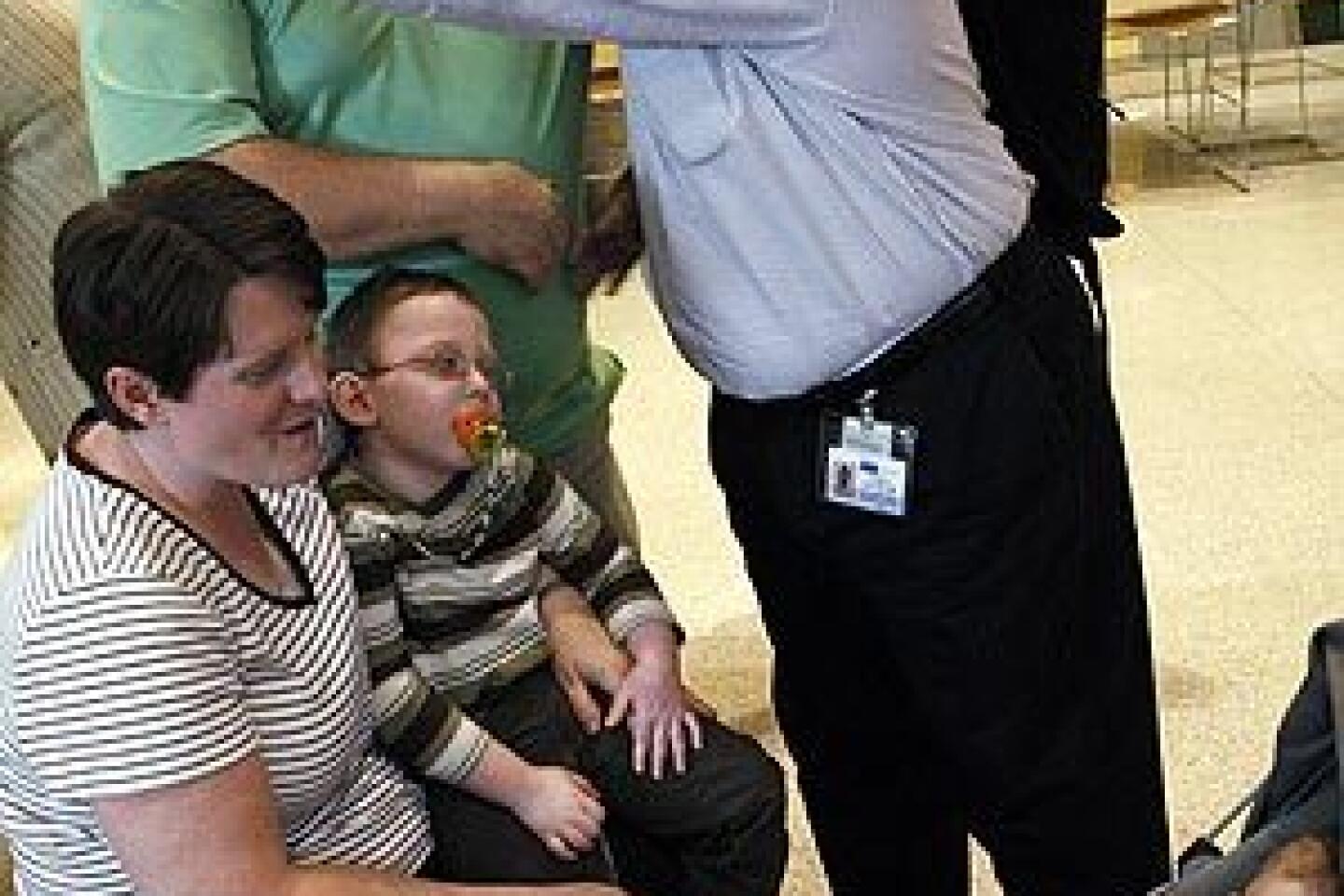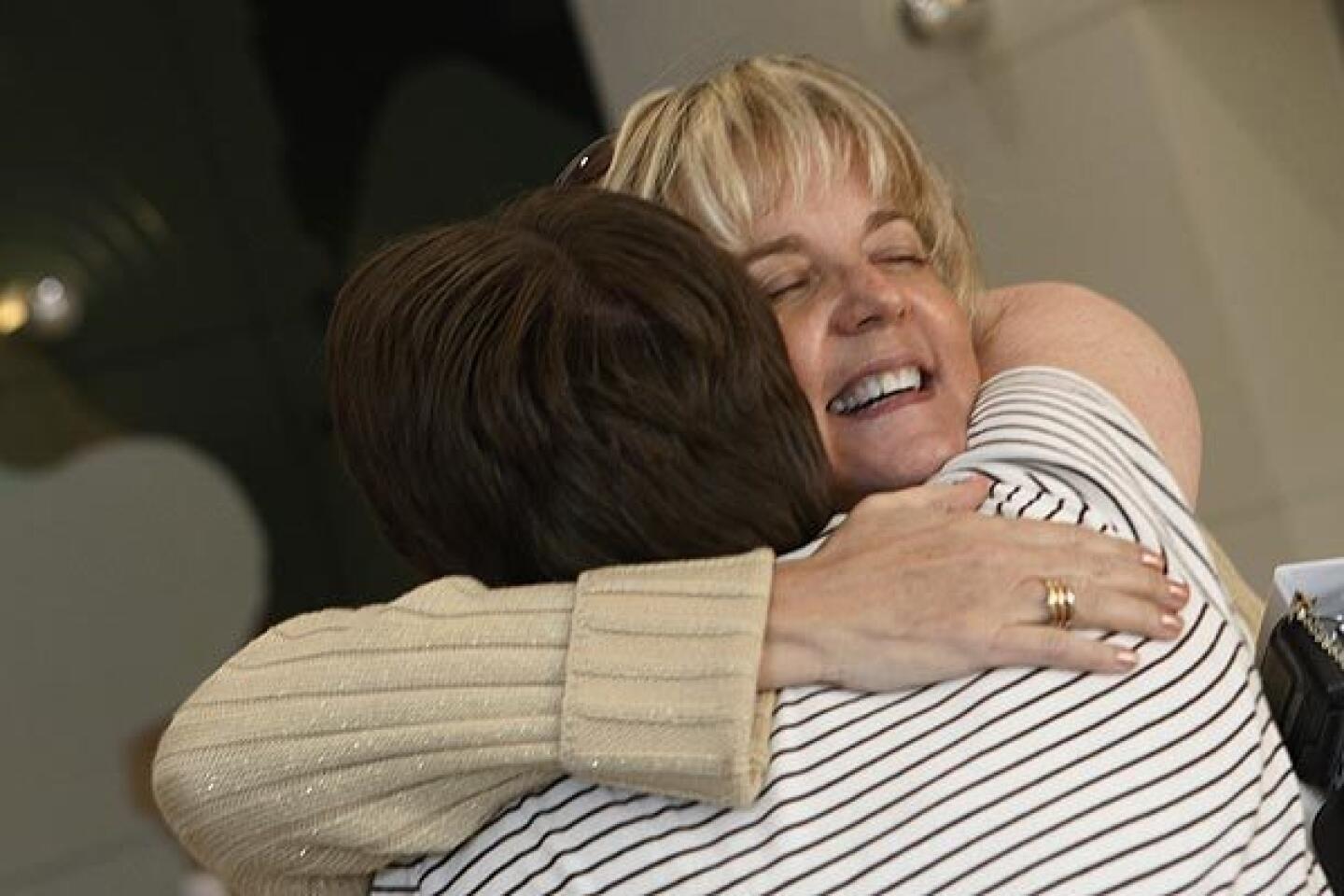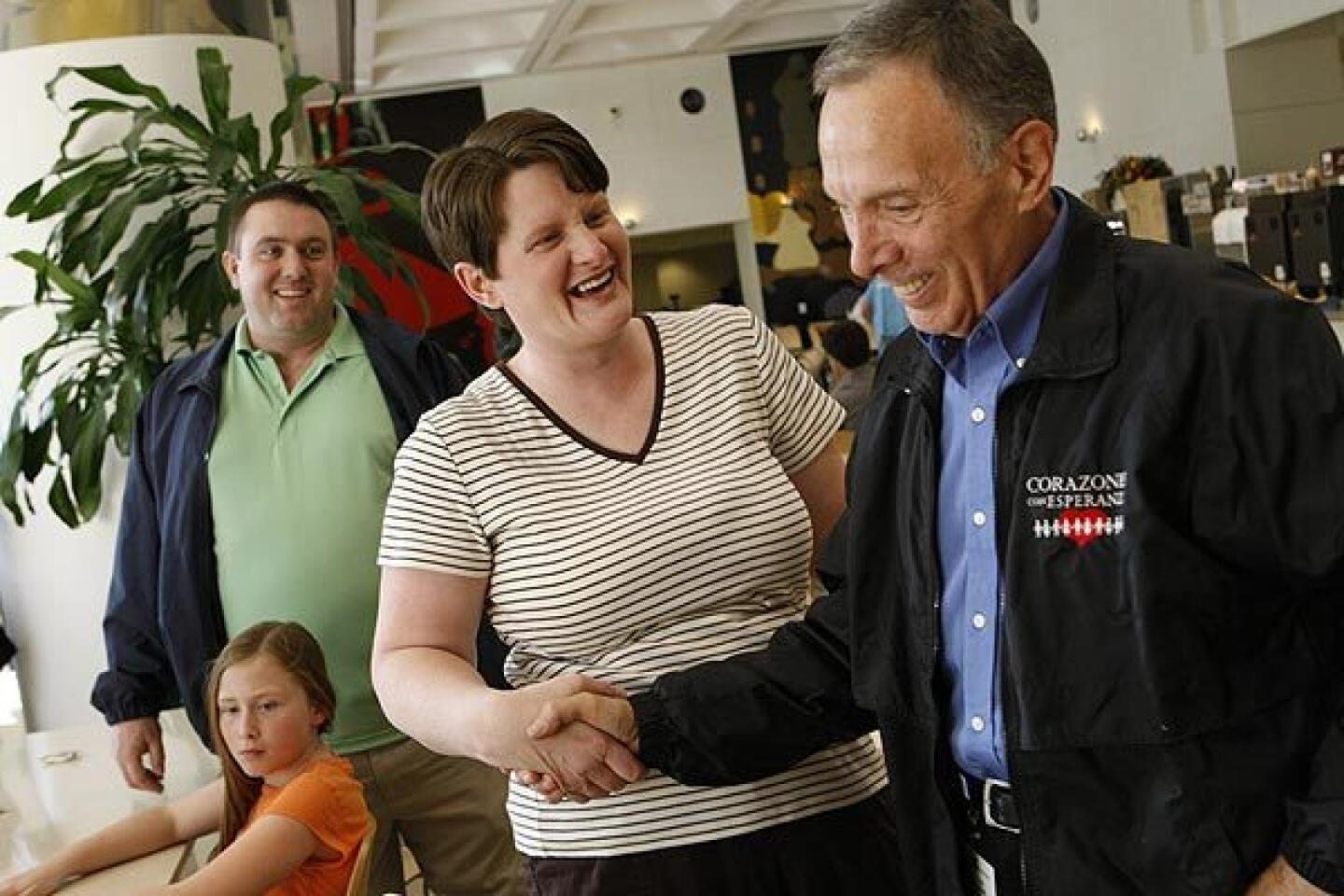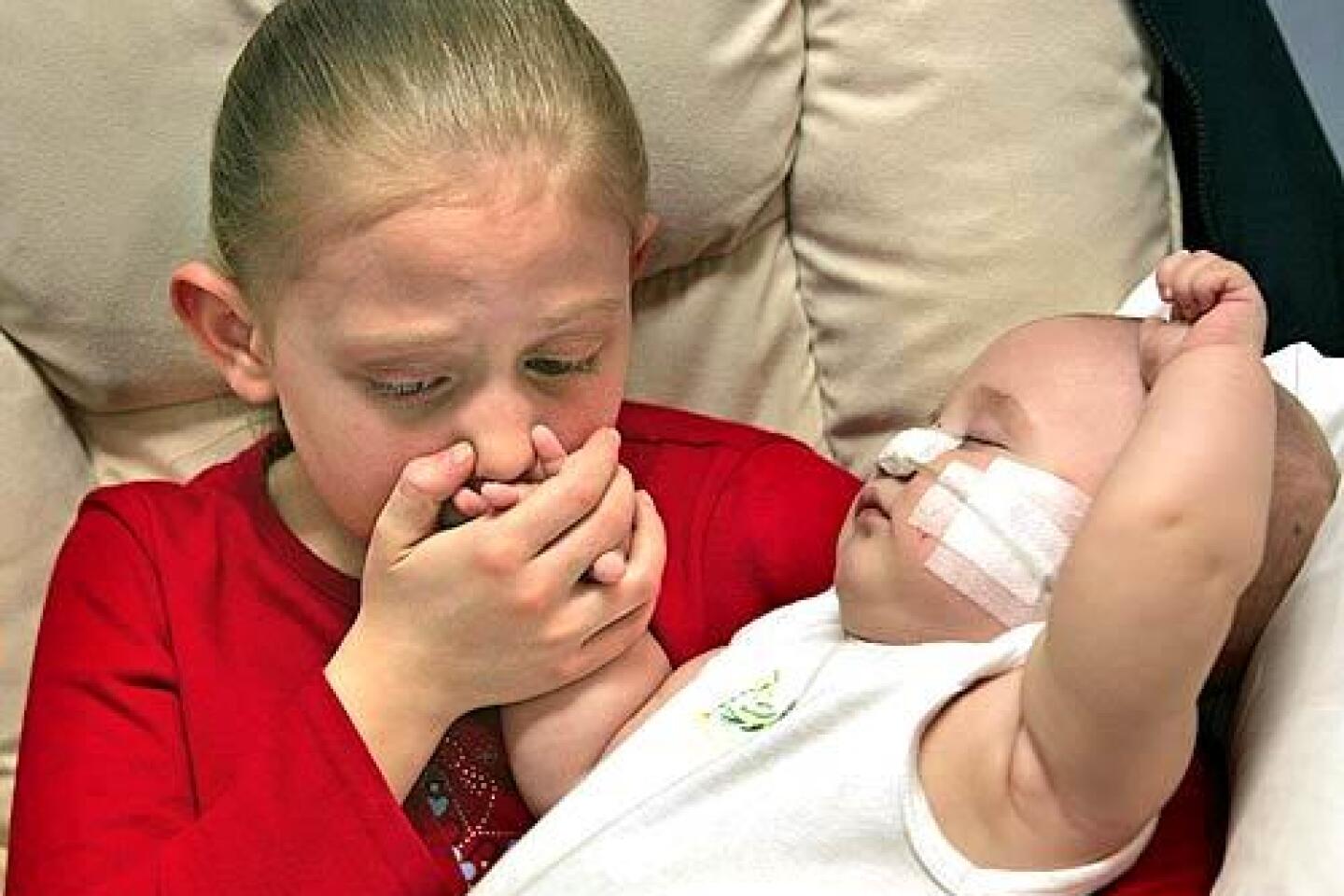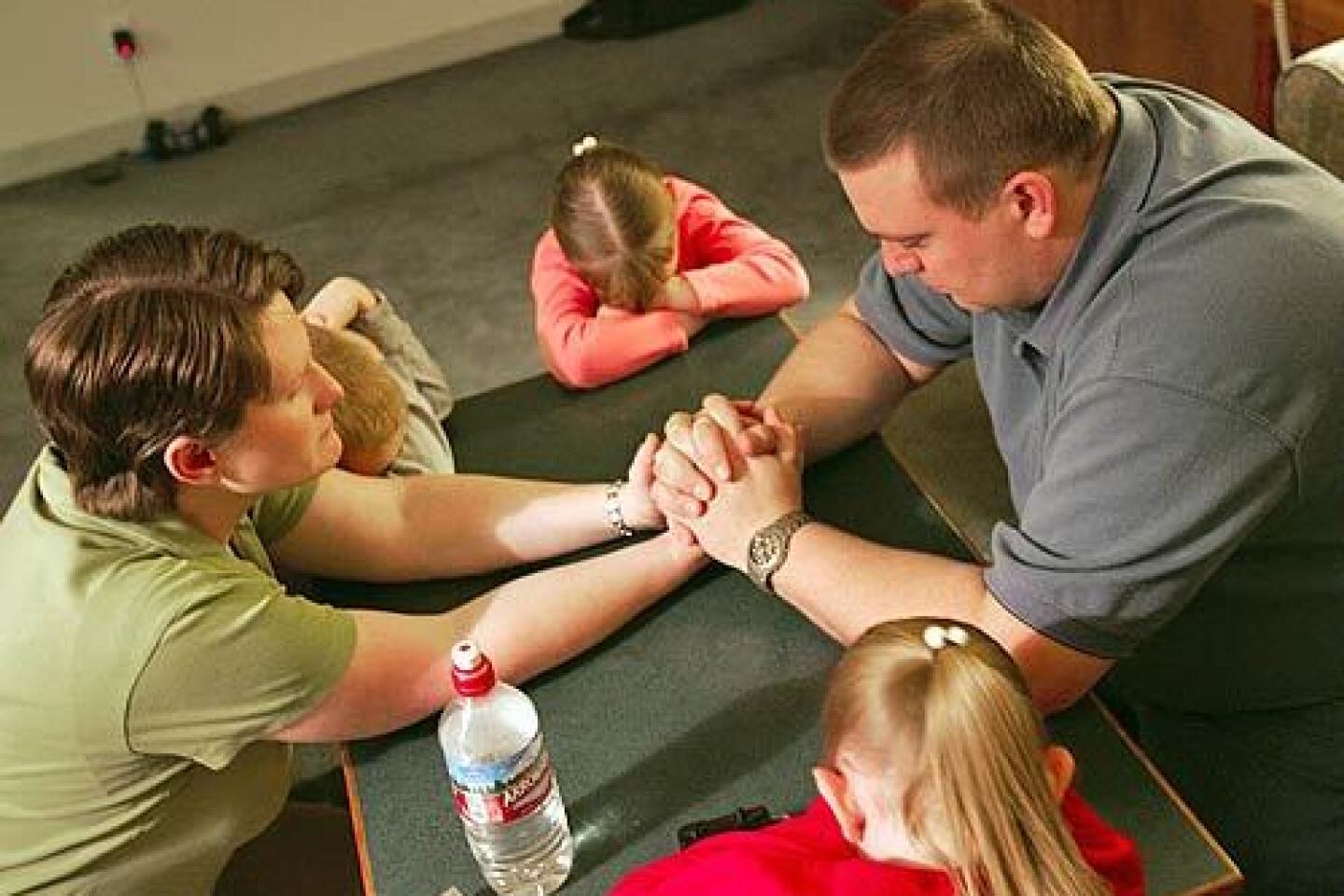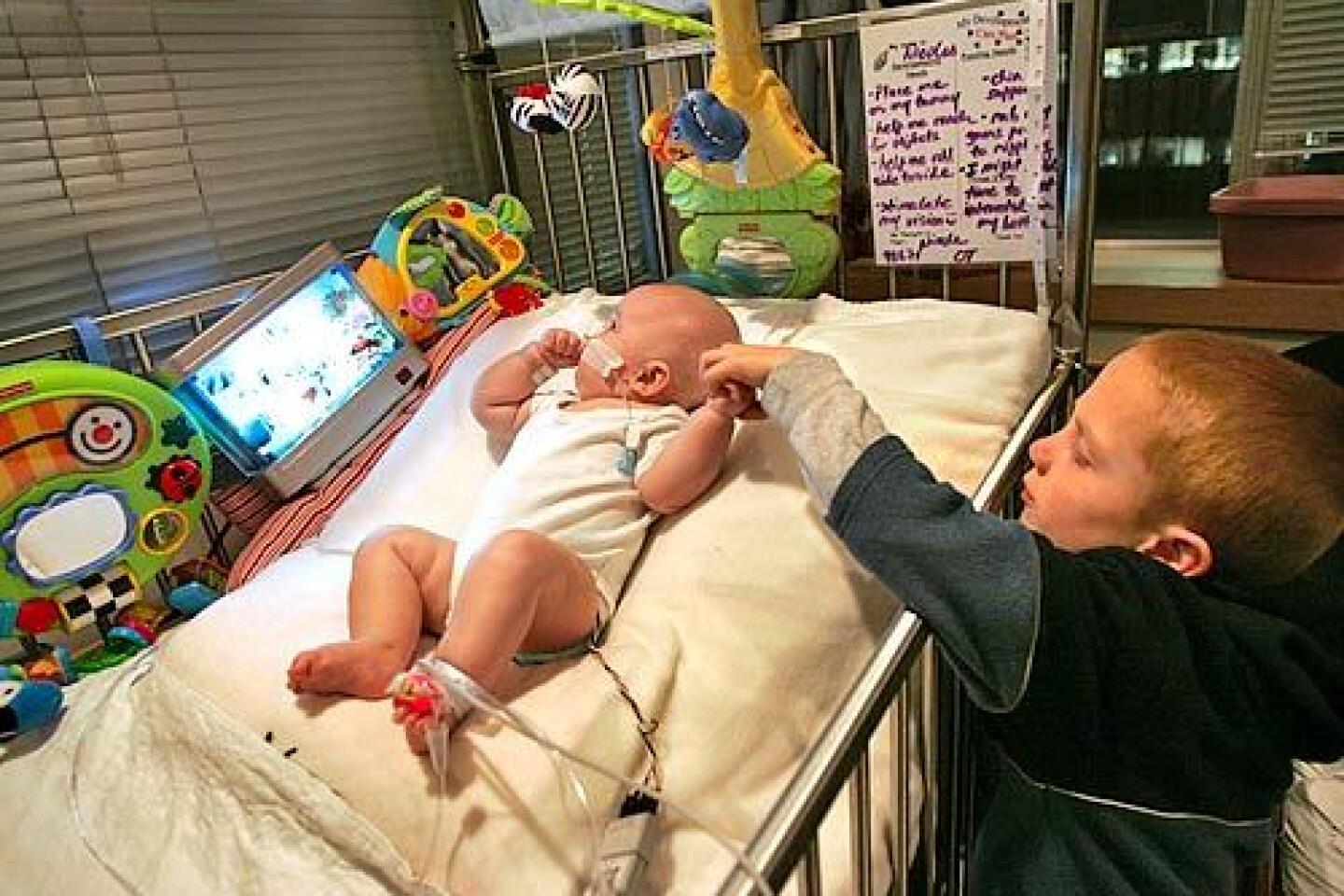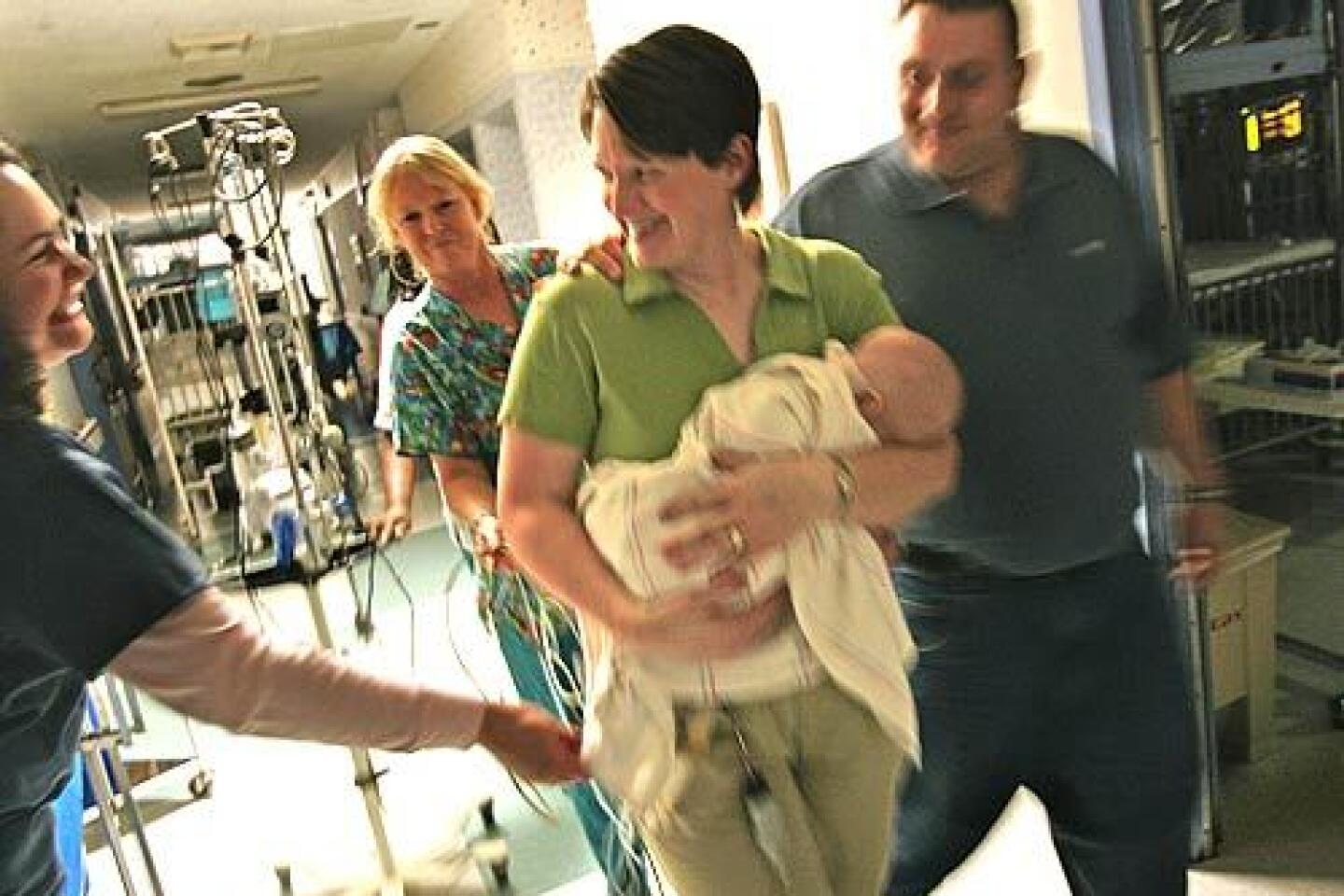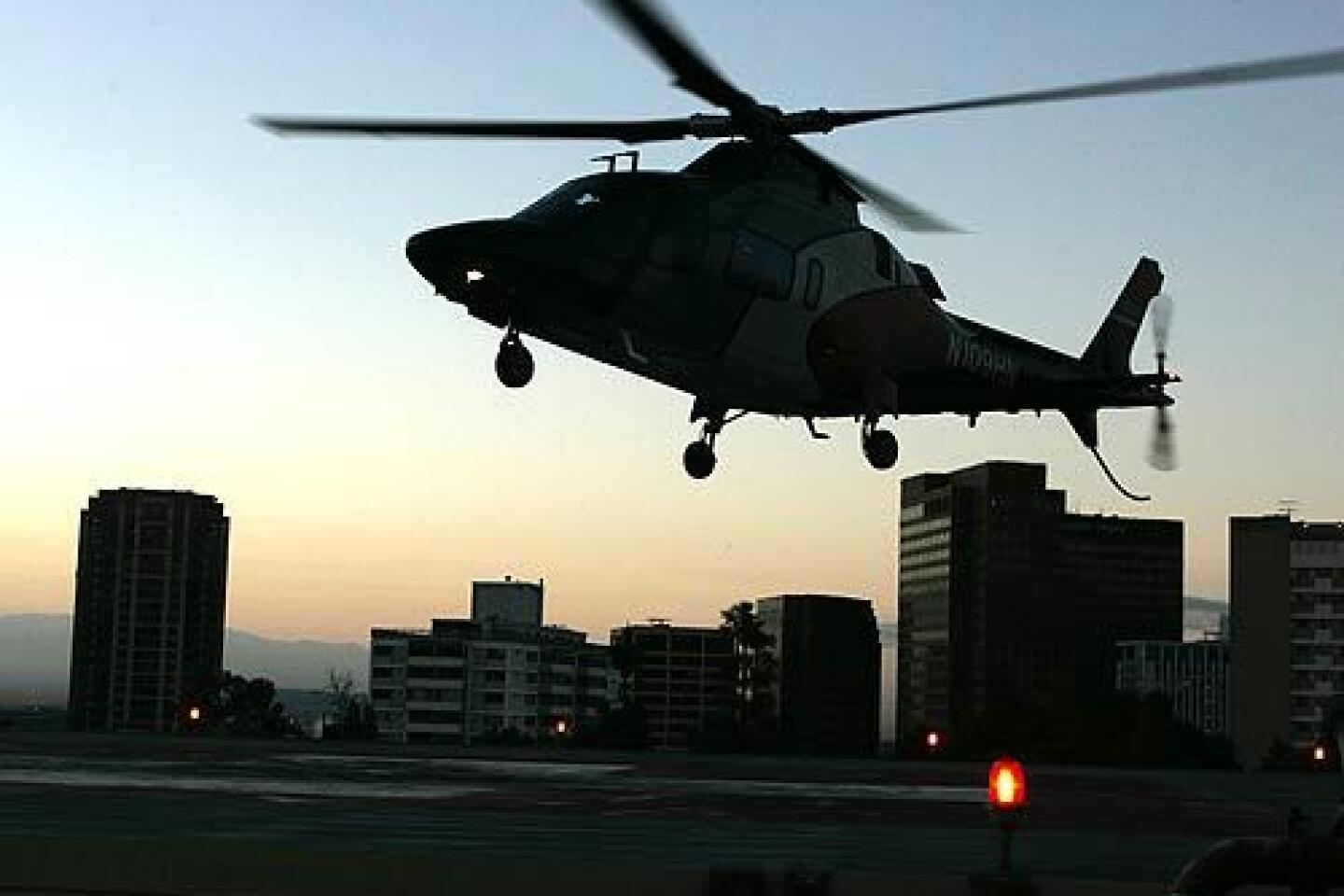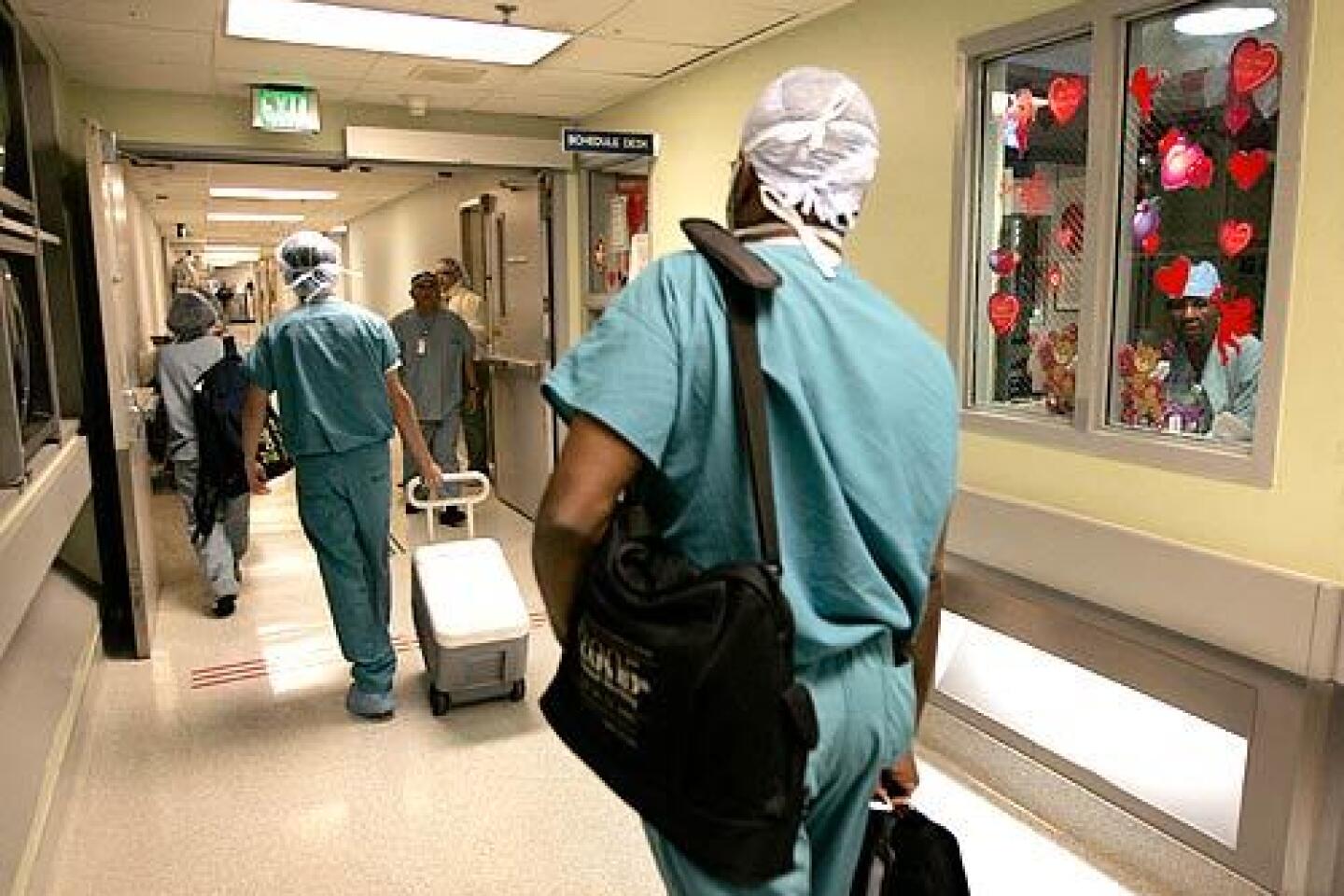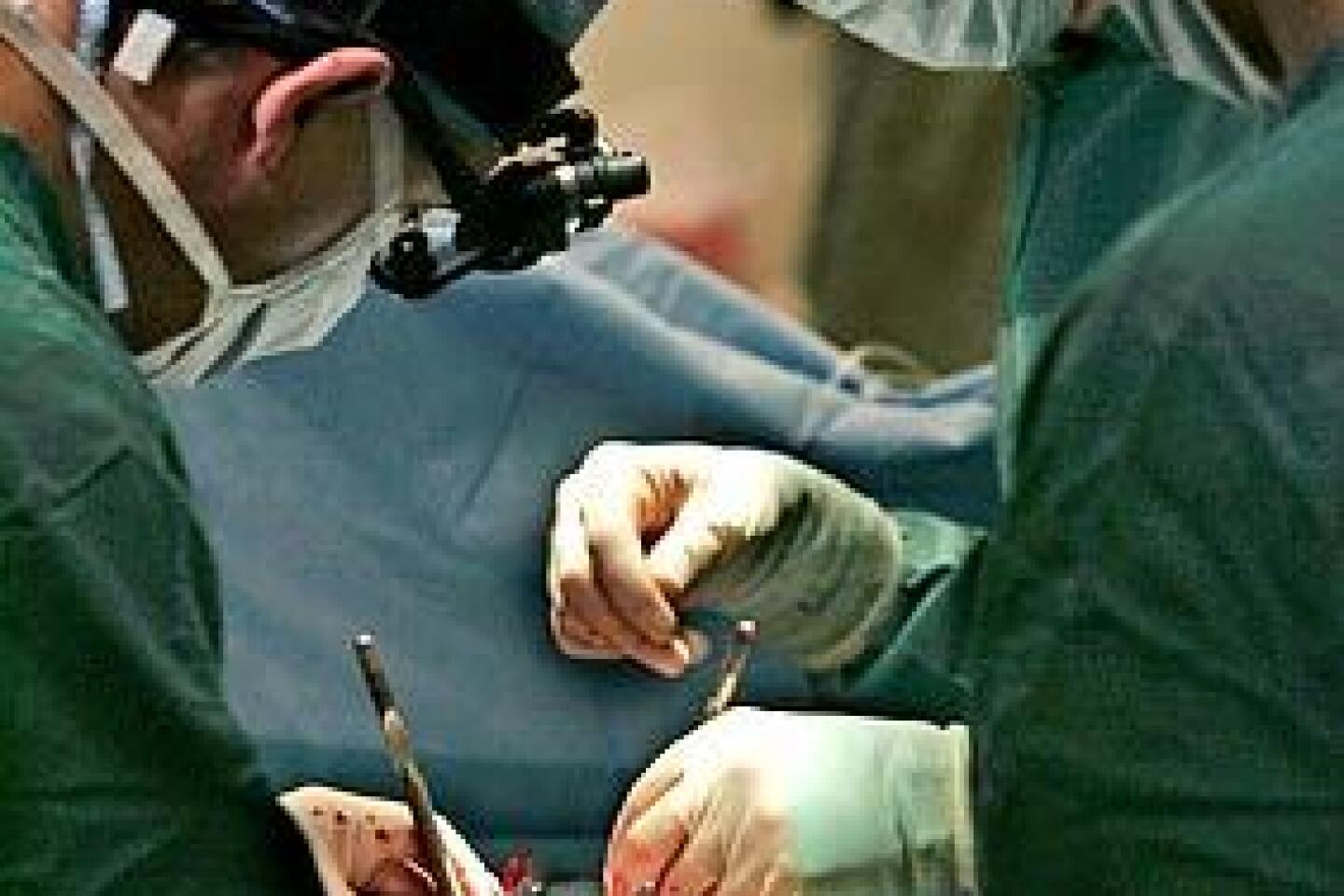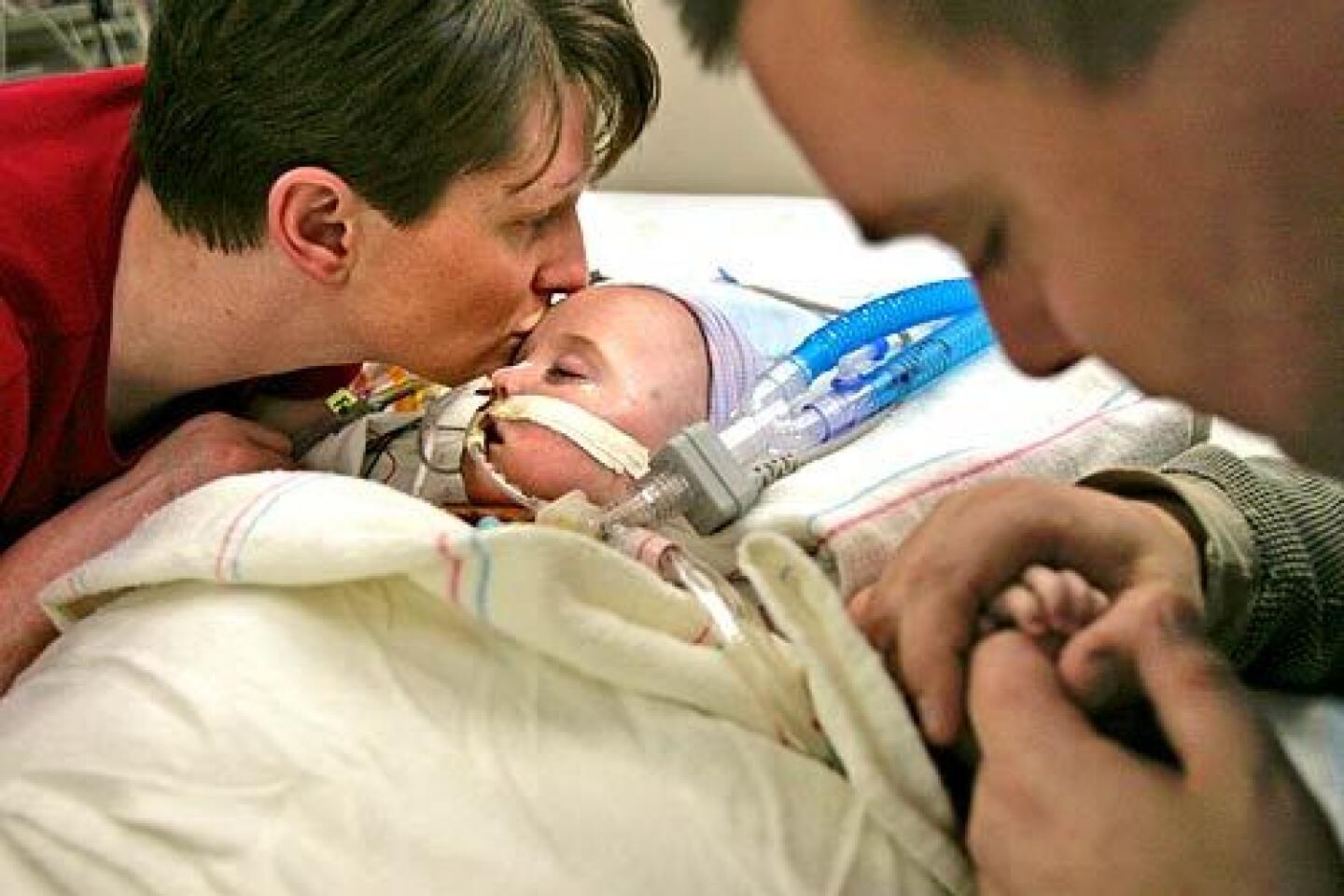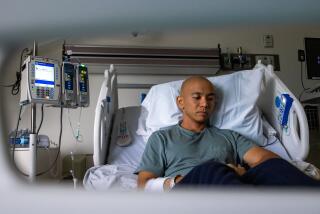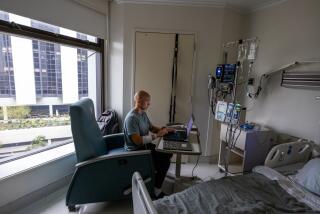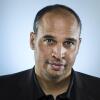A New Heart for Baby Nick
Nick was lying in his mother’s arms when the cellphone rang. She figured it was just another routine call. “Hi, doctor,” she said, joking. “You’ve been avoiding us.”
“Well, I don’t have to avoid you any longer,” Dr. Juan Alejos replied. “We have a heart.”
We have a heart. He was too little to know it, but those words would mean everything to Nick Draper, only 7 months old. He nuzzled peacefully against his mother’s chest.
Nicole Draper, 32, looked down at her round-cheeked baby and into his soft gray eyes. “Nick, there’s a heart for you,” she said. “A heart, Nick. A heart.”
All at once, the world around Nick stepped into a carefully choreographed, exquisitely intense, enormously dangerous dance. He was at the center. During heart transplant surgery, nothing is certain. Most heart transplants are successful, but things can go wrong, very wrong.
Something did.
Nick’s new heart refused to beat strongly or regularly. When the surgery ended, instead of sewing him up and starting him on his way to a normal life, doctors left his chest open and attached tubes from the inside to a heart-lung bypass machine to keep him alive.
That was Thursday. Since then, Nick has been in critical condition, sprawled on his back in intensive care at UCLA Medical Center.
On Saturday, his heartbeat gained a bit of strength. It gained a bit more Sunday. A bit more Monday. Then, Tuesday morning, the doctors eased him off the bypass machine. His heart pumped well. Nick Draper was on his own.
If he kept this up, eventually they could close his chest, and he would be on his way to recovery. “I’m cautiously optimistic he is going to follow through and do well,” said Dr. Mark Plunkett, who performed the transplant. “The next 24 to 48 hours are very important. The further out we get, the better. The likelihood, though, is this is going to work out.”
That was good news for Nick’s mother and for his father, Mike Draper, 33. But there was another Draper baby, Nick’s identical twin brother, Nate. He needed a new heart too. The family prayed for one. If and when one became available, the Drapers knew they would have to go through all of this all over again.
At first, it had been pure joy.
Nicole hung up from Dr. Alejos, the cardiologist overseeing the twins’ care, and punched her husband’s number into the cellphone. “They have a heart, honey. A heart.”
Mike Draper brought Caitlin, 6, and Brendan and Emma, also twins, 5, to the hospital. Nick took turns snuggling in the arms of his sisters and big brother. Then his father propped him up on a pillow, held his hand and whispered: “You’re gonna be home, yeah. Gonna be home. They’re bringing you a new heart, and you’re gonna get better, little buddy.”
Home was Phoenix. Nick and Nate were flown to Los Angeles in July after doctors in Arizona diagnosed dilated cardiomyopathy, which meant the left and right sides of their hearts were in a cross-shaped jumble. The boys would die, the doctors said, if they did not get new hearts. Nick would get one first, because in the beginning Nate had been too sick for a transplant. By the time Nate was healthy enough, Nick was at the top of the list.
Shortly after they arrived in L.A., The Times began telling their story.
Now two high priests of the family’s Mormon faith came to the hospital room, where both babies had beds. Everyone gathered in a circle. Nick nestled quietly in his mother’s arms, and Nate in his father’s. One high priest poured oil atop Nick’s head. “Nicholas Gregory Draper,” the other said, “we bless you that your body will have the strength to recover and you will get better quickly . “
As the family prayed, a team of doctors from UCLA flew to a city five hours away to pick up Nick’s new heart. Where exactly the Drapers did not know. By law, the location and name of the donor, a child, were confidential. The doctors had to make sure the new heart was healthy and small enough to fit into Nick’s chest.
At about midnight, a nurse telephoned.
Nick’s mother took the call. “The heart is good!” she shouted. She turned to his father and raised her arms. “The heart is good!”
Nick’s father smiled hugely and signaled thumbs up, happily and with astonishment. His little boy’s luck was changing.
“It’s a go,” Nick’s mother said, as if to convince herself. “They’re going to start preparing him at 3:30. We should hear the whir of the helicopter landing at about 5:30. It’ll have his heart!”
Shortly after 3 a.m., Nick’s mother and father took him down a third-floor hallway. He clutched them, wide-eyed, cooing, then crying.
They stood outside a surgical suite. A board listed patients for the main operating room. It had one name on it.
Draper.
“Good luck, baby.” His parents had puffy eyes. Their faces were ashen. They kissed his little cheeks and arms. “Love you, baby.”
“Catch you on the other side.”
HIGH STAKES
There was Nick, inside the white-tiled room, lying on a large table, knocked out by an anesthetic. His arms and legs were splayed out from his body. He was naked. Then the doctors covered most of him with blue sheets. All I could see were his stomach and chest.I was there so I could write with precision about Nick’s heart transplant.
Dr. Plunkett stood near the operating table, dressed in a green smock and white surgical gloves. He wore a pair of magnifying glasses, and a small lamp perched on his head.
By his estimate, he had performed nearly 300 heart transplants on both adults and children, but he felt a connection with this patient. He had gotten to know Nick’s mother and father, and he marveled at their strength. More than that, he had known Nick nearly all of his young life. He had been aware for months that if a heart ever came, he would be the doctor to operate.
“The stakes are high,” he had said at the time. “The rest of his life is hanging on this.”
Now Plunkett was playing smooth jazz on an iPod behind the table. He and other doctors and nurses hovered over Nick. The boy’s new heart still had not arrived, but as the clock passed 5 a.m., Plunkett picked up a small scalpel and began cutting.
By 5:50 a.m., much of Nick’s tiny chest lay open. An incision, 3 to 4 inches long, stretched from just below his neck to near his belly button. The doctors spread the opening into an almond shape.
With scissors and forceps between his fingers, Plunkett moved his hands steadily and gracefully over the incision and into Nick’s chest, like a conductor guiding an orchestra through a slow waltz. He cauterized small blood vessels, creating puffs of white smoke that made the room smell of burning flesh.
He placed tubes into the incision. They were for drugs and for blood. The tubes were clear and the diameter of a dime.
He attached one of the tubes to Nick’s aorta and stitched it into place with a fine thread. The tube would carry blood into Nick’s body from the bypass machine, which would take over pumping and oxygenating the blood when Plunkett took out Nick’s malformed heart.
Other clear tubes would take used blood out of Nick’s large veins and bring it back to the bypass machine.
A nurse said a jet carrying Nick’s new heart had landed at Van Nuys Airport.
How long would it take a helicopter to bring it here?
“Fifteen minutes, doctor. Fifteen minutes.”
Plunkett waited. I stood just behind him. Nick’s heart was moving, up and down, up and down.
A saxophone played softly on the iPod. Five minutes. Ten. Fifteen.
The metal doors to the operating room opened. In walked a doctor carrying a worn, white Igloo cooler. Inside, tucked into a plastic bag surrounded by ice, was Nick’s new heart.
Plunkett did not waste a moment. He signaled to start the bypass machine. Its steady drone filled the room. Blood filled the clear tubes and began to circulate through Nick.
Now Plunkett closed off the blood supply to Nick’s heart. He used scissors and snipped the heart loose. He took it out. It was puffy, the size of a small orange.
Then he took Nick’s new heart out of its plastic bag and examined it. It looked smaller than the old one. The new heart was red and surrounded by a thin, white membrane. With his hands, Plunkett lowered it into Nick’s chest.
Plunkett began sewing, attaching the heart to the aorta. It took nearly an hour. His hands moved slowly, carefully. Sewing. Cutting. Adjusting.
He seemed pleased when the new heart pulsed. Once it began beating strongly and with the proper rhythm, he could take Nick off the bypass machine and his chest could be stitched up.
Quietly, Plunkett said to turn down the machine, so Nick’s new heart could take over.
The heart beat, but not hard.
Turn up the machine, Plunkett said. He waited. Now turn it down again.
Still, Nick’s new heart would not pick up the load. It would not beat hard enough.
Plunkett tried a third time. Nothing changed. Neither did Plunkett’s expression or his voice. Inside, though, he would say later, his concern was growing.
Why wouldn’t the new heart beat right?
Plunkett let several minutes go by. His manner betrayed none of his worry. By now it was nearly 9:30 a.m. The surgery was in its fifth hour.
He began asking for information.
“What’s his temperature again? I need it now . Calcium levels, please . Ejection fraction? Do we have it?”
How long, he asked, had this heart been out of its donor’s body? Nearly eight hours, came the reply. Again, Plunkett turned down the bypass machine. Again, the new heart would not pick up the slack.“Call Dr. Alejos,” Plunkett said, his voice steady and calm. “I think we have rejection.”
A MOTHER’S FAITH
Nick’s father and mother were holed up in the boys’ hospital room with Nate. They tried to sleep. They tried small talk. They tried to be confident.A nurse walked in. She looked grim, both would say afterward. She said Nick was struggling, that his new heart wasn’t working right. Maybe, she said, his body was rejecting it.
But the surgery was not over. They’d have to wait and see.
Nick’s father was overwhelmed. Part of him wanted to flee, to run out of the hospital and run away as far as he could. What if his little boy died? As he had so many times before, Mike Draper wondered if he could bear it.
Nick’s mother never doubted. She had absolute belief in God and in his promises. Nicole and Mike Draper walked outside to get some air. She reminded him of the high priests’ blessing, how the sacred oil had been poured onto Nick’s head.
“They blessed Nick’s body,” she said. “Blessed that it not reject the heart. Blessed him with an immediate recovery. I believe that’s going to happen.”
A CRISIS, THEN HOPE
In the operating room, Plunkett wasn’t so sure.He knew he had to change direction. He had to sew in new tubes and put Nick’s new heart on a different bypass machine — smaller and portable, so it could leave the operating room with him.
Plunkett’s hands moved across and into Nick’s chest, cutting new holes, putting in the new tubes. His hands moved more rapidly now, but nothing else about him changed. The uninitiated might have thought everything was fine.
It wasn’t. This was a crisis.
I was asked to leave. I watched Nick through a window from the hallway. Two aides from UCLA began hugging. I wondered if I were about to watch a baby die.
Plunkett attached Nick to the new bypass machine. Nick’s chest was still open. The doctors and nurses covered his wide, red incision with a thin, clear wrap. Blood flowed in and out through the tubes.
As the doctors and nurses peeled away his sheets, I could see that all of Nick’s color had drained away. His skin looked almost as white as porcelain.
They took Nick to a recovery room.
Plunkett removed his gloves, washed his arms and hands and walked to the boys’ room to talk to Nicole and Mike.
The next week would be crucial, he said. Nick’s heart might not be a good match. Tests would tell. Meantime, a bypass machine would give his new heart a rest. It would keep Nick alive — for a few weeks at most. Some babies died in a few days.
Maybe, though, if his new heart got enough time, it would take over. Maybe it was struggling because it had been outside of its donor too long. Maybe it needed some time to recover.
Nick’s father and mother cuddled his twin brother. Sick as Nate was, holding him as he laughed, cried and sneezed seemed to help.
The next day, Friday, was worse. Blood pooled in Nick’s lungs. Doctors cleared them, but Plunkett was so worried he slept overnight in his cramped hospital office.
Then the good news began. There were moments when doctors took Nick off the bypass machine, and his heart seemed to beat stronger.
A rest seemed to be just what his new heart had needed. An X-ray showed it was starting to function well.
On Saturday morning, Nick’s mother and father visited him. Mike Draper couldn’t look at his open incision. He wanted it covered. Doctors took Nick off the anesthetic for a few minutes.
His mother and father stood over him. He opened his eyes, groggy and dazed.
“Baby Nick,” his father said, “you’re going to get better.”
Nick wrapped his fingers around his father’s thumb. His father felt him squeeze.
Kurt Streeter can be reached at kurt.streeter@latimes.com.
More to Read
Start your day right
Sign up for Essential California for news, features and recommendations from the L.A. Times and beyond in your inbox six days a week.
You may occasionally receive promotional content from the Los Angeles Times.
